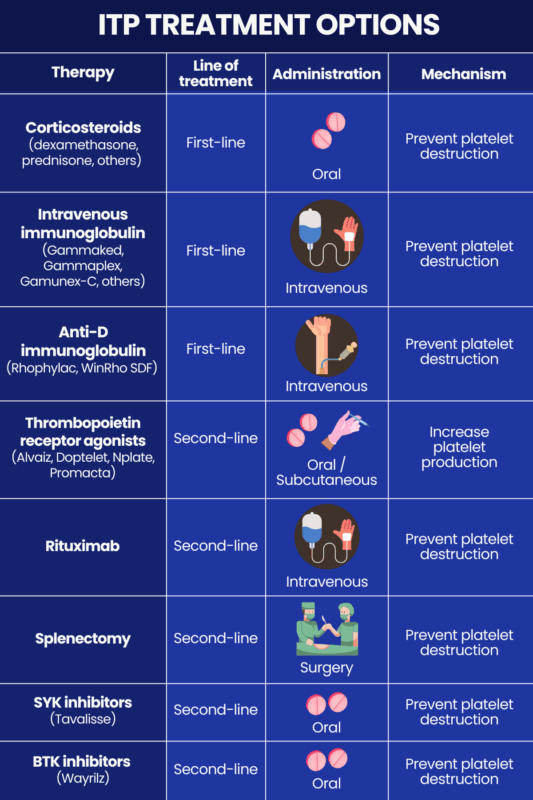Immune thrombocytopenia treatment options
Last updated Sept. 4, 2025, by Lindsey Shapiro, PhD

While there is no definitive cure for immune thrombocytopenia (ITP), there are several treatment options available to help increase platelet counts and lower the risk of significant bleeding.
ITP is caused by the immune system mistakenly attacking the body’s healthy platelets, which are needed for proper blood clotting. This leads to ITP symptoms such as easy bruising and bleeding.
There are a variety of available therapeutic approaches, but the decision on if and when treatment for ITP is necessary depends on a number of factors. Appropriate and prompt disease management is key to preventing serious bleeding and other complications.
ITP treatment considerations
A prompt ITP diagnosis and treatment start are key for the best possible outcomes. According to recent guidelines, the approach to ITP treatment depends on several factors, including:
- age
- presence and type of bleeding
- platelet counts
- bleeding risk and lifestyle factors
- previous treatment history
- ITP type.
After an ITP diagnosis, a person’s healthcare provider will look at all of these factors to come up with an appropriate ITP treatment plan.
- If there are no major bleeding symptoms and platelet counts are high enough, careful observation may be preferred over active treatment. This is particularly common in children, in whom ITP often goes into spontaneous remission without treatment.
- When a person has substantial symptoms or a very low platelet count, treatment is usually warranted. Most adults with chronic ITP need treatment at some point.
ITP can be primary, where there is no known underlying cause of the disease, or secondary, where there’s a known disease trigger. Primary ITP treatment may involve a number of different therapies to increase platelet counts, while secondary ITP treatment also centers around managing the underlying condition.
First-line ITP treatments
First-line treatment approaches for ITP are generally aimed at stopping the immune system’s destruction of platelets. There are a few different options for patients and their healthcare providers to consider.
Corticosteroids
First-line treatment usually involves oral corticosteroids, a class of strong immunosuppressive medications that can act in various ways to stop the immune system from destroying platelets. These medications can work to reduce the production of self-reactive antibodies that destroy platelets, and also decrease platelet clearance in the spleen.
Corticosteroids for ITP may include:
- dexamethasone
- prednisone.
Corticosteroids can come with significant side effects, so their use typically is tapered down once platelet levels have come back up. In some cases, they’re used with other medications that allow their doses to be reduced.
Intravenous immunoglobulin
Intravenous immunoglobulin therapy, known as IVIG, consists of collecting antibodies from the blood of healthy donors and infusing them into the bloodstream of a recipient. Although the exact mechanisms are not completely understood, it is thought that these antibodies interfere with the signaling process that normally enables immune macrophages to destroy platelets in the spleen, effectively preventing platelet destruction in ITP.
IVIG tends to increase platelet counts more quickly than corticosteroids, so it’s useful when there’s a need for a rapid platelet increase, such as when bleeding is already occurring, or before a surgery or medical procedure.
There are several brands of IVIG medications that are specifically approved to treat ITP, including:
- Gammaked
- Gammaplex
- Gamunex-C
- Octagam
- Panzyga
- Privigen.
Anti-D immunoglobulin
Anti-D immunoglobulin therapy works similarly to IVIG, but it specifically contains antibodies that target a protein, called Rh, that’s found on the surface of most people’s red blood cells. These medications can be used by people who still have their spleen and who are Rh-positive.
Brands of anti-D immunoglobulin medications approved to treat ITP include:
- Rhophylac, which can be used in adults with chronic ITP
- WinRho SDF, which can be used in children with chronic or acute ITP, adults with chronic ITP, and people with ITP secondary to HIV infection.

Second-line ITP treatments
It can be difficult to maintain a long-term response to first-line therapies. As such, chronic ITP treatment commonly requires second-line agents. The decision as to the most appropriate treatment for any patient will depend on that person’s specific disease presentation and preferences.
Thrombopoietin receptor agonists
Thrombopoietin receptor agonists, or TPO-RAs, work to stimulate the production of platelets in the bone marrow to counteract their destruction by the immune system. These medications can be used by people who haven’t responded well enough to previous therapies and may include:
- Alvaiz (eltrombopag tablets), taken orally, for people ages 6 and older with persistent or chronic ITP
- Doptelet (avatrombopag), taken orally, for adults with chronic ITP, and children, ages 1 and older, with persistent or chronic ITP
- Nplate (romiplostim), given via subcutaneous, or under-the-skin, injections, for adults and children ages 1 and older who’ve had ITP for at least six months
- Promacta (eltrombopag), taken orally, for patients ages 1 and older with persistent or chronic ITP.
Rituximab
Rituximab is an antibody therapy sometimes used for ITP that works to lower the levels of B-cells, which are the immune cells responsible for producing antibodies, including the self-reactive ones that drive platelet destruction in ITP.
It is sold under the brand name Rituxan and others, with biosimilars also available. It is given intravenously or directly into the vein. While rituximab is not specifically approved for ITP, it is commonly used off-label for treating autoimmune diseases.
Splenectomy
If medications don’t work well to control ITP, a splenectomy — a surgery to remove the spleen — might be considered. Platelet destruction in ITP mainly happens in the spleen, so removing the organ is a way to quickly put a stop to it.
Many people with ITP who have a splenectomy achieve disease remission. However, the procedure is done less often now than it used to be due to the risk of procedure-related complications, and the fact that not having a spleen leaves a person vulnerable to infections.
SYK inhibitors
Tavalisse (fostamatinib disodium hexahydrate) is an approved oral medication for ITP that works by inhibiting an enzyme called spleen tyrosine kinase (SYK). In ITP, SYK is needed for the function of the immune cells responsible for destroying platelets. This medication can be used in adults with chronic ITP who have responded insufficiently to other treatments.
BTK inhibitors
Wayrilz (rilzabrutinib) is an approved oral medication for ITP that works by inhibiting Bruton’s tyrosine kinase (BTK), an enzyme important for the function of the immune cells that drive platelet destruction in people with the disease. It can be used in adults with persistent or chronic ITP who haven’t responded well to previous treatments.
Other medications
In some cases, other immunosuppressive or immune-modulating agents may be used for people with ITP who aren’t responding well to standard treatments. In general, the evidence for the use of these medications is not as strong as it is for other first- and second-line therapies. Among such therapies are:
- azathioprine
- cyclosporine A
- danazol
- dapsone
- mycophenolate mofetil.
Emergency treatment
If ITP causes significant bleeding, emergency treatment may be needed to quickly get it under control. This may include:
- a platelet transfusion
- IVIG
- intravenous steroids.
Other medications, including TPO-RAs, may also be used for acute ITP treatment depending on the specific situation.
Lifestyle changes to help manage ITP
A number of things can be done by people with ITP to help manage their disease, including:
- going in for regular check-ups and disease monitoring
- taking all medications as prescribed, and talking to a doctor about which over-the-counter treatments might increase bleeding risk
- practicing good oral hygiene to prevent bleeding gums
- avoiding high-contact sports and activities that can cause injury
- watching closely for signs of infection and staying up to date on any recommended vaccines
- limiting alcohol use and quitting smoking, which can affect platelet levels and make symptoms worse.
Alternative ITP treatments
There are no natural, alternative, or dietary interventions that are definitively proven to help people with ITP. Some research is underway to evaluate herbal remedies as an ITP natural treatment, but none are currently able to replace standard medical therapies.
Patients should always talk to their healthcare providers before trying any ITP alternative treatments, as they may not always be safe.
Bleeding Disorders News is strictly a news and information website about the disease. It does not provide medical advice, diagnosis, or treatment. This content is not intended to be a substitute for professional medical advice, diagnosis, or treatment. Always seek the advice of your physician or other qualified health provider with any questions you may have regarding a medical condition. Never disregard professional medical advice or delay in seeking it because of something you have read on this website.
Recent Posts
- Experimental VWD treatment HMB-002 shows promise in animal models
- African ancestry linked to 50% higher iTTP relapse risk after rituximab
- Seeing my rare disease highlighted on TV brings validation and hope
- Managing anxiety levels may improve quality of life for adults with ITP: Study
- Many types of von Willebrand disease may be underdiagnosed: Study
